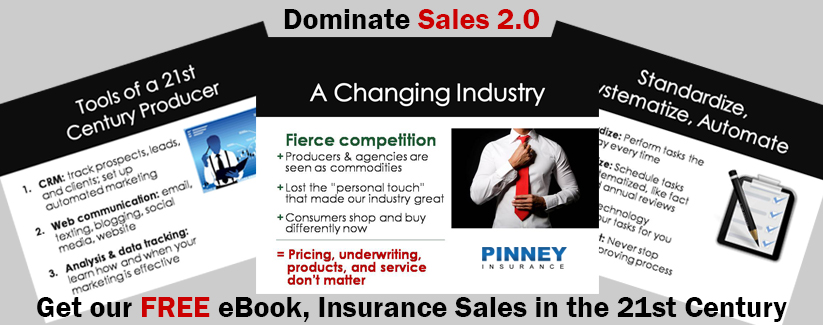We're starting a new feature here at Pinney Insurance - we'll be reading a new business book every month, and you're invited to read along.
This May, we'll be reading The Ultimate Sales Machine by Chet Holmes. The book's subtitle tells you why we're interested in this book: "Turbocharge Your Business with Relentless Focus on 12 Key Strategies."
Do we want to turbocharge our business? Of course. But taken as a whole, that sounds pretty overwhelming. This book breaks the process down into 12 key strategies, which is something we can handle. Before we dive in, let's do a quick preview of the book.
We're Looking Forward To...
The table of contents provides a veritable hit list of sins in the business world - and strategies to overcome them. Here's what caught our eye:
Instituting Higher Standards and Regular Training - Preprogram Your Organization to Run Like a Finely Tuned Machine
- This sounds a lot like our "Standardize, Systematize, Automate" strategy - it'll be interesting to see where these overlap. In insurance sales, where tiny details make all the difference to an app IGO (in good order), we've found that pre-programming is the easiest way to assure quality control. You take the best version of your process, break it down into documented steps, and make it mandatory.
The High Art of Getting the Best Buyers - The Fastest, Least Expensive Way to Dramatically Increase Sales
- If the cost of leads has been getting you down, your ears probably perked up at "least expensive," right?
The Seven Musts of Marketing - Turbocharge Every Aspect of Your Primary Marketing Efforts
- Now we're wondering what differentiates "primary" marketing efforts from "secondary." Are we doing enough marketing on either level? The checklists and exercises in this chapter will be key.
The Nitty-Gritty of Getting the Best Buyers - Step-by-Step, Day-by-Day Tactics to Land Your Dream Clients
- We're big fans of anything broken into step-by-step, day-by-day tasks. Have you seen our 60-Day Plan for Social Media Success?
First Impressions
Mastery is a direct result of pigheaded discipline and determination.
To be honest, we skipped all the praise, the acknowledgements, the note to the reader, and the foreword. We bought the book, which means we're already convinced it has something to offer. Yet another page of "you should listen to this guy" speeches from the author's mentors or fans aren't going to get us to the answers we need any sooner. The preface, however, has a few gems to share that are important for establishing the mindset needed to (a) read this book, and (b) benefit from it.
Holmes says it takes pigheaded discipline and determination to get his formula right. If you can apply that level of focus to the 12 strategies in the book, he says you will be able to master marketing, management, and sales. The example he provides is helpful - as a boy, practicing karate, he realized it wasn't necessary to learn thousands of moves. Instead, all he had to do was master a handful of them by practicing each one thousands of times.
Cool. We don't have the brain space to remember 4,000 moves anyway.
Implementation, not ideas, is the key to real success.
There's another key point in the introduction. Holmes says, "You can profoundly improve your company or department if you absolutely commit to one hour per week in which you do nothing else but work on making the business much more effective" (4). We like the sound of that. One hour is do-able. He describes a CEO who was able to refine his team's sales process and more than double the lowest-producing agent's sales in six months. That's one hour per week x 26 weeks = 26 hours.
What could you do to improve your process, leadership, and marketing in 26 hours?

